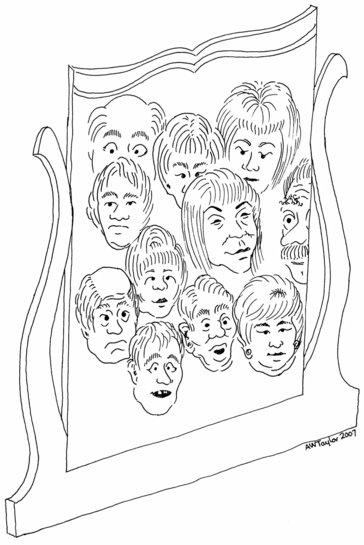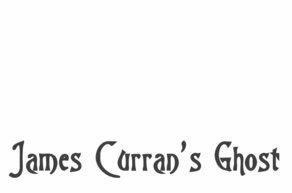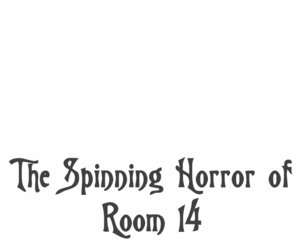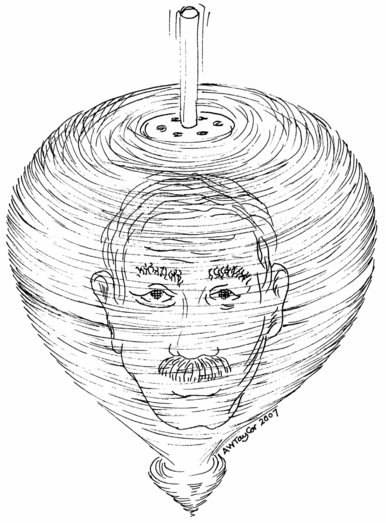Authors: Dale Jarvis
The Golden Leg (6 page)

T
here was nothing warming or welcoming
about the light. Even from a distance, it seemed devoid of heat, like a full
moon on a cold winter’s night. But it was not a dull light, or a dim one, and it
was possessed of an unwavering brightness. It was not the homey light of flames
licking through the coals in a grate, nor the romantic glow of flickering
candles. It was a light like those seen of marshes late at night, or of phantom
ships in stories told to frighten children.
The young squire had seen the light in the central window of the abandoned hall
while out riding early one night. The evening sky was like molten copper, and
the shadows were extending their reach along the ground. The owners had long
deserted the house, and it had no occupants, so the strange light had drawn his
attention. He had slowed his horse to look, and then turning away, had ridden
on.
The image of that lit window in the abandoned hall stayed with him. Any light
in an empty house was strange. But the more he thought on it, the more he was
convinced that there had been something strange about the quality of
the light itself. The squire was not an imaginative young man,
nor was he one given to the contemplation of the world’s mysteries. But the
light he had seen in the window somehow seized upon whatever small bit of
curiosity he possessed, and it tugged upon his mind like a fish on a well-baited
hook.
He thought about that window for a long time, silently.
A few weeks later, he was sitting in the warmth and safety of his study with a
visiting friend. Once they had a good quantity of port wine under their belts,
the squire told his friend of the illuminated window in the old hall.
“You’ve spotted a ghost,” joked his friend. Then, made bold by the drink, he
added, “Let us go see if we can catch him!”
The squire looked to his glass, and swirled the last bit of port remaining. He
seemed not to have heard his friend’s words for a moment, but then drained the
glass in one decisive motion and rose to his feet.
“We go tonight,” he said, and strode from the room.
They mounted their horses, and rode off to the old estate. The property had
been vacant for many years, for so long in fact that there were few who knew the
names of the original owners. There was a caretaker, however, this much the
squire knew. The caretaker was an old man from the village, who lived in a small
cottage on the grounds of the estate. It was the caretaker’s job to keep the
gates locked, to keep unwanted visitors out, and to keep the wild from engulfing
the property completely. The latter was a task which seemed to grow more
formidable with every passing year.
The two men approached the house, and as they came close, the
friend drew in close.
“Sure enough,” he said, pointing to a window illuminated with an eerie,
forlorn-looking glow. “There is your light!”
The squire glanced once at the window and rode on, up to the door of the
caretaker’s cottage. He knocked on the door, and when the caretaker answered,
the squire demanded entry to the main house.
The old man shrugged, and shuffled off into the shadows of his cottage. He
returned, bony fingers clutching a ring of old iron keys. He unlocked the front
door of the house, and ushered the two men through the darkness of the house to
the door leading to the upper chamber.
The caretaker selected one long key from its fellows on the ring. He slid the
key into the heavy lock and turned it, once. The click echoed through the empty
hall.
“I’ll not go in,” murmured the caretaker, taking a step aside and backing away
from the still-closed door.
The two men entered, and found that the light in the room was sufficient for
them to see the various articles of furniture still remaining in the room. What
struck them most was the fact that there was no lamp or lantern to be seen. The
room had a light of its own, and it was as strong under the tables as it was
above. Indeed, there was not a single shadow in the room, nor did the two
visitors seem to cast any shadows themselves.
Running the full width of a great mantelpiece was an enormous gold-framed
mirror. In it, every detail of the
chamber was reflected: the
table, the chairs, the pictures on the walls. Gazing into the mirror, the squire
beheld his own frightened face staring back at him. Alongside it, everywhere he
looked, he saw other faces, thin, drawn, and shining, hundreds of translucent
faces all bleeding the eerie light. Hundreds of eyes glared at him from the
midst of the glass.
The squire gasped in horror, and his friend turned and uttered a similar,
strangled cry as he looked upon the mirror. Both realized as if with one thought
that the room was not haunted by one ghost, but by a countless number of
spectres, their intangible bodies emitting the cold luminosity that filled every
corner of the chamber.
They had been in the room only a few seconds. As they looked in horror at the
glaring, silent faces, a strange faintness stole over them both. It was a
numbing sensation, and both felt as if their very lives were being sucked out of
their bodies.
The two quickly left the room, slamming the door shut on the awful light. They
left the property immediately, and returned to their homes by separate
paths.
Neither man spoke of the incident to another living soul, but the deathly and
deadly luminousness took its toll. Each man fell sick and grew weaker with each
passing day. Before one year had run its course, both men lay buried beneath the
sod of the old churchyard. They were mourned by their loved ones, and all
remarked how sad it was that two such men should be taken away so young.
And in the abandoned hall on the old estate, the lumi
nous
chamber glowed all the more brightly, an additional pair of cold, white faces
staring out from the gold-framed mirror.


M
r. James Curran was born in County
Waterford, Ireland, in 1794. He immigrated to Newfoundland in the early 1800s,
and lived much of his life in and around the Southside of Holyrood, in
Conception Bay.
In the 1860s, the local parish decided that it needed a new cemetery. Land for
the graveyard was donated by a local man, John McGrath. With free labour
supplied by the men of the parish, the land was cleared and a fence was started.
Word spread that every man in the parish was expected to supply the materials
and labour to erect one length of fence.
A pious man, James Curran, was one of the volunteers who worked on the
cemetery, and he dutifully erected his portion of the graveyard fence. Many of
the local men went away to work in the fishery, and work on the fence slowed.
James Curran took it upon himself to make sure the fence was finished, and
finish it he did. But the work proved to be too much for him, and shortly
thereafter, he grew gravely ill. As he lay close to death, he called a close
friend and coun
tryman to his side, and asked that he be buried in
the graveyard he had helped construct.
His friend shook his head, sadly. As the ground was not consecrated, no burials
were permitted in the new graveyard.
“If you don't have me buried there, I will come back and haunt you,” swore
James Curran. Upon uttering this oath, he died, only a few days before
Christmas, 1867.
The friend went to the parish priest, and told the man of Curran's final
request. He also told the priest of Curran's dying vow.
“Let him come back and haunt me,” mocked the priest, “and I will take care of
that ghost.” With this, he ordered the body to be buried at the old Northside
Cemetery.
So Curran was buried, and that was the start of hard times for the old priest.
One night shortly thereafter, the priest was called from his home to see a
seriously ill man. On his return home, he was forced to pass along the Northside
Cemetery.
As they passed by, the horse stopped at the cemetery and refused to budge an
inch farther forward. Harry, the priest's driver, goaded the horse onward, but
with little success. The horse only moved forward after the priest rose, blessed
the cemetery, and said a short prayer.
Their trials were not yet over. They approached the priest's house, and set out
over a frozen pond. A strange storm whipped up across the ice. They could not
find a clear path off the pond, and there are those who said it was the ghost of
James Curran that led the horse astray throughout the night.
It was not until daylight that the helpless travellers found
their way to safety. The priest's hair had turned completely grey during the
night.
Exhausted, the priest entered his house, and climbed the stairs. At the top, he
heard banging noises, the sound of some great commotion. Frightened, he searched
the house, only to find that he was alone in the building.
The priest ran back to where Harry was stabling the horse. He ordered the
driver back to where they had come from, and sent instructions that the local
men should dig up the body of James Curran and take it to the new
graveyard.
It was a cold, wet, late-December day when they dug up the coffin of James
Curran and loaded it onto a cart. As the men hauled it to the new cemetery,
countless icicles formed on the coffin as they slowly made their way through the
miserable weather.
The priest met them at the graveyard, and said the proper prayers to consecrate
the grounds. James Curran was reburied, becoming the first person to be buried
in the new cemetery. After that, he seemed to rest in peace, and never bothered
the priest again.

M
r. Gilbert, a civil engineer, was out
of town on business. Through an error of his own in reading the railway
schedules, he found himself stranded, for there was no train southward until the
following morning.
The unfortunate man wandered around the town, trying to find a hotel room for
the night. But every hotel he tried was full, as it was the middle of the busy
tourist season. He gave up, and decided to return to the railway station and
spend the night there. A local man, however, having seen him turned away, asked
the engineer if he needed a room.
“Why yes, I do need a room,” said Mr. Gilbert.
“You’ll find it difficult to get one this time of year,” said the stranger.
“The town is very full, but there is one place you might try. It isn’t anything
fancy, but the people who own it are good, honest people, and keep it very
clean.”
The engineer thanked the man, and taking down the
address
hurried along. When he got there, he saw that it was a very plain building on a
rather rundown street. The landlady, however, was a kind, neatly dressed woman,
who fussed over Mr. Gilbert pleasantly as she showed him to his room.
The room, Number 14, was at the top of the stairs. The landlady brought him a
cup of tea and a light meal, and then bustled off. Mr. Gilbert drank his tea and
ate his supper. As he finished, he thought he heard a low, sniggering laugh from
behind him, and suddenly felt something flick against his ear. The engineer
whirled around, but there was no one there. Laughing a bit to himself at his own
tiredness and imagination, the man settled into bed, and soon fell asleep.
Several hours later, the man awoke with a start to the sound of a curious
humming noise. He looked across the room, which was full of moonlight. As he
did, he got an even bigger start.
In the centre of the room, some strange object was spinning around and around.
It was too shadowy to determine exactly what it was, but to the man’s eyes it
looked like, yet not quite like, a giant spinning top. It was like a top in
terms of its shape and movement, but unlike a top in that the man could sense it
had a pair of eyes. The creature seemed to be watching the man in the bed,
gazing upon him with a foreboding, evil look.
At first the man was more curious than frightened, but as the humming rose in
volume and the sense of being watched increased, the man began to grow deeply
afraid. For a few minutes the spinning horror kept to the centre of the room,
but then it start to approach the bed, the droning noise
becoming louder as it approached. Much to his horror, the man realized that he
could not move. His entire body, from head to toe, seem paralyzed, and all he
could do was watch the dark form spin closer.
With a supreme effort, Mr. Gilbert willed his body to move. He jumped out of
the bed on the side farthest away from the dark being. To get to either the
light switch or the door he had to pass by the thing, an idea that held no great
charm for him. He paused, uncertain what to do. The whirling phantom, however,
did not hesitate. The humming increased as it got nearer and nearer to the foot
of the bed. In a panic, Mr. Gilbert made a dash for the door, grabbing his coat,
and as he did, the spinning horror shifted directions and started to come after
him. He ran for the door, chased by the thing. He sprinted through, slammed the
door shut, and did not stop running till he reached the end of the
hallway.
The twirling ghost, or whatever it had been, did not follow him. The man
wrapped himself up in his coat, and slept on the staircase landing for the rest
of the night. In the morning, he tip-toed back to Room 14, opened up the door a
crack, and peered inside. The room was empty. He entered cautiously, and
gathered up his belongings. As he hurried down the hallway, he once again heard
the same low, sniggering laugh, and again felt something, or someone, flick his
ear. When he swung around he saw no one.
Mr. Gilbert hurried down the stairs, paid the landlady, and against her
protests did not stay for breakfast. He rushed
to the railway
station and caught the first train out of town. As the train pulled out of the
station, heading south, he fell into conversation with his fellow passengers,
and told them of the strange events the nights before.

One passenger, a native of that town, revealed that the house in
question was well-known to be haunted. Local folklore claimed that a woman had
murdered her husband in the building many years previously, and that she had
somehow avoided arrest. What became of her was unknown.
What strange connection there might have been between the spinning horror of
Room 14, the murdered man, and his missing wife was never fully explained. Some
things in this world, it would seem, must always remain a mystery.